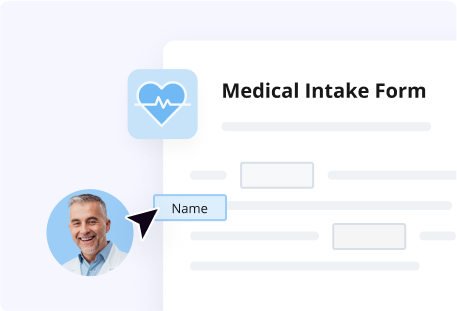Type any topic that interests you
Unlock the ins and outs of automating generic patient intake questions form for mental health with training

About this course
After finishing this course, you’ll be able to take your practice to a whole new level by reducing your time and effort spent on unproductive manual data collection, boosting the experiences of your patients, and minimizing risks of data breaches and non-compliance with HIPAA regulations.
What’s included:
- Lessons highlighting all aspects of streamlining generic patient intake Unlock the ins and outs of automating generic patient intake questions form for mental health with training for mental health with airSlate.
- Quiz maintaining your learning momentum going.
- A badge showing your progress and results in training by airSlate Academy.
What will you get?
- An in-depth walkthrough of steps to develop your Flow from A to Z with the training.
- The most effective practices of putting together your generic patient intake Unlock the ins and outs of automating generic patient intake questions form for mental health with training for mental health flow.
- A guide on how to integrate with some available services and systems of record.
- Useful pieces of advice for running your Flow with maximum productivity and minimum wasted effort.
Who is this training for?
- Medical employees offering mental health care and gathering data with generic patient intake Unlock the ins and outs of automating generic patient intake questions form for mental health with training from patients.
- Medical office admins, such as Front Desk Supervisors, ensuring effortless office activities.
- IT specialists operating in the medical industry.
More courses you might like
What our students say
Start learning today
Sign now for free
Questions & answers
The perks of automating the generic patient intake questions form for mental health include improved efficiency, record processing accuracy, and cost savings. By automating patient intake processes, healthcare providers can accomplish a multitude of advantages, such as decreasing wait times, removing the necessity for manual information entry, decreasing expenses associated with printing and shipping, and enhancing file security. Moreover, it significantly improves patient satisfaction by providing a seamless and time and effort-saving intake flow that minimizes waiting times, streamlines information collection, and removes potential errors and inaccuracies.
Typical bottlenecks of the generic patient intake process are manual information entry in questions form, long wait times, and the risks of losing or misplacing patient documents. Automation can help deal with these problems by digitizing patient intake operations, automating routine tasks including submitting personal information and medical history forms for mental health care, and keeping patient data online, which can improve precision, decrease waiting time, and enhance document encryption.
At airSlate, a Flow (in our case generic patient intake questions form Flow for mental health) means a process encompassing a set of file templates and fillable forms. They can be automated and personalized utilizing pre-established rules. Flow automation tools help organizations decrease manual workload and streamline recurring processes.
To register for the training on generic patient intake questions form Flow for mental health, simply set up an account with the airSlate Academy and confirm your email address to unlock an array of educational resources. Then choose the course or start with the one for beginners to grasp how airSlate works in general. With access to high-quality training materials, visuals, and quizzes, you can expand your knowledge, improve your understanding, and advance your career at your own pace.
You can use various tools and resources to create your generic patient intake questions form, including online templates, healthcare software, and document creation programs. The process typically entails identifying essential information that needs to be gathered from a patient, designing a form, and testing it to ensure it is user-friendly and easy to complete. A wide variety of training options online will help you streamline this process and make it as efficient as possible.
The generic patient intake is a essential component of patient registration. It permits healthcare providers to request crucial patient data through questions form, like personal and contact details, health record, visit scheduling, and insurance data. Patient registration significantly affects your clients’ overall experience by establishing a favorable first impression, minimizing waiting times, and offering healthcare personnel with exact information for treatment and insurance claims.












